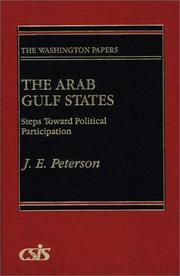Book
Year: 1999 Publisher: Washington, DC : World Bank,
Abstract | Keywords | Export | Availability | Bookmark
 Loading...
Loading...Choose an application
- Reference Manager
- EndNote
- RefWorks (Direct export to RefWorks)
Periodical
Year: 2005 Publisher: Dubai, UAE : Gulf Research Center
Abstract | Keywords | Export | Availability | Bookmark
 Loading...
Loading...Choose an application
- Reference Manager
- EndNote
- RefWorks (Direct export to RefWorks)
Persian Gulf States --- Europe --- Relations
Book
ISBN: 0710303769 Year: 1994 Publisher: London ; New York Kegan Paul
Abstract | Keywords | Export | Availability | Bookmark
 Loading...
Loading...Choose an application
- Reference Manager
- EndNote
- RefWorks (Direct export to RefWorks)

ISBN: 0275928810 Year: 1988 Publisher: New York : Praeger,
Abstract | Keywords | Export | Availability | Bookmark
 Loading...
Loading...Choose an application
- Reference Manager
- EndNote
- RefWorks (Direct export to RefWorks)
Book
ISBN: 9780863561474 Year: 2017 Publisher: London : Saqi Books,
Abstract | Keywords | Export | Availability | Bookmark
 Loading...
Loading...Choose an application
- Reference Manager
- EndNote
- RefWorks (Direct export to RefWorks)
Since the oil boom of the 1970s, the Gulf Cooperation Council States have attempted to achieve economic stability and realise their development goals. Such efforts have so far been in vein, however, as these states' autocratic governments have closed off their political systems with the support of international allies, especially the United States. In this exhaustive analysis of the political economies of the GCC since the 1970s to the present, the author examines the factors responsible for the failure of the states to achieve lasting change in development and security. Focusing on institutional structures where oil wealth has been confined to the few, and the consequences of failed legitimacy at home that has led to dependence on foreign powers, the author charts the consistent disparities between governance and the needs of the local population, to the detriment of genuine development. He concludes that the only way to ensure stability and growth in the region is to dismantle the alliance of autocracy, oil and foreign powers. Instead, democracy and reform are key to ensuring stability in the region.

ISBN: 1280051558 0203499328 9780203499320 9786610051557 6610051550 9780714654133 0714654132 0714654132 9781135772499 9781135772536 9781135772543 9781138985568 Year: 2003 Publisher: London F. Cass
Abstract | Keywords | Export | Availability | Bookmark
 Loading...
Loading...Choose an application
- Reference Manager
- EndNote
- RefWorks (Direct export to RefWorks)
This volume discusses the evolution of the British-protected Gulf states during the 1960s and explains how these small Shaikhdoms moved towards independence. Based on extensive research using British documents from the Public Records Office and selected American documents from the National Archives, this book investigates the relationship between British officials and Arab Gulf Shaikhs. At the beginning of what was to be their final years as guardians of the Gulf, British officials pressed for political progress, co-operation among the Shaikhdoms and improvements in education and health care.
Book
ISBN: 1912866803 9781912866809 1912390612 9781912390618 Year: 2019 Publisher: Solihull, West Midlands, England
Abstract | Keywords | Export | Availability | Bookmark
 Loading...
Loading...Choose an application
- Reference Manager
- EndNote
- RefWorks (Direct export to RefWorks)
Persian Gulf States --- Armed Forces --- History
Book
Year: 1967 Publisher: Berkeley : University of California Press,
Abstract | Keywords | Export | Availability | Bookmark
 Loading...
Loading...Choose an application
- Reference Manager
- EndNote
- RefWorks (Direct export to RefWorks)
Book
Year: 1976 Volume: 1639 Publisher: [Paris] : P.U.F.,
Abstract | Keywords | Export | Availability | Bookmark
 Loading...
Loading...Choose an application
- Reference Manager
- EndNote
- RefWorks (Direct export to RefWorks)
Book
Year: 1964 Publisher: London : Faber and Faber,
Abstract | Keywords | Export | Availability | Bookmark
 Loading...
Loading...Choose an application
- Reference Manager
- EndNote
- RefWorks (Direct export to RefWorks)

 Search
Search Feedback
Feedback About UniCat
About UniCat  Help
Help News
News